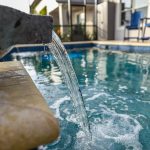There’s nothing better than jumping into your pool after a hot day, but many pool owners underestimate the amount of work involved in maintaining a pool. While pools can provide hours of relaxation and entertainment, the water’s chemistry is not to be taken lightly. It is always important to make sure your pool’s chemicals are balanced before anyone takes a dip. Pool chemistry is the ultimate balancing act. To maintain a pool properly, you must keep the water balanced with chemicals specifically for the pool and keep those chemicals at the correct levels. If Calcium Hardness levels are too high, or alkalinity or pH is too low, there could be problems – such as your water becoming corrosive or the formation of scale. Maintaining the proper calcium hardness, pH and alkalinity levels, prevents numerous problems, such as: Discolored or cloudy water Pool surface/equipment corrosion Algae formation Formation of stains and scale Pool Chemistry & Water Balancing Chemicals Maintaining your pool chemistry correctly is all about water balance and keeping elements out of your pool – such as oils and dirt. Although there are others, the most important levels to keep on top of are pH, total alkalinity and Calcium Hardness. But what are these and what do they mean? Here’s a brief explanation of each so you have a better understanding of the important role each one plays. pH pH is the measurement of the acidity or basicity of the water. The scale goes from 0 to 14, with 7 Read the full article…







